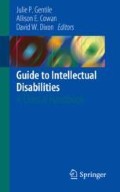Abstract
Individuals with intellectual disabilities (IDs) often suffer from co-occurring neurologic conditions, which can greatly affect their quality of life. These individuals are more likely to suffer from conditions such as seizure disorders, attention-deficit/hyperactivity disorder, autism spectrum disorder, dementia, delirium, and motor disorders (e.g., tics, antipsychotic-induced disorder). ID is commonly comorbid with other neurodevelopmental disorders, often before the child enters grade school. Sometimes ID is associated with the development of neurocognitive disorders later in life. ID may be associated with a known environmental factor (e.g., prenatal alcohol exposure) or genetic condition that can predispose to other neurologic problems (e.g., Down syndrome is a risk factor for Alzheimer’s dementia). Neurologic disorders can be difficult to diagnose in those with ID due to barriers in communication. Because these disorders increase impairment of personal, social, academic, or occupational functioning, identification can help clinicians improve assessment and treatment.
Access this chapter
Tax calculation will be finalised at checkout
Purchases are for personal use only
References
American Psychiatric Association. Diagnostic and statistical manual of mental disorders. 5th ed. Washington, DC: American Psychiatric Association; 2013.
Boettger T, Rust MB, Maier H, Seidenbecher T, Schweizer M, Keating DJ, Faulhaber J, Ehmke H, Pfeffer C, Scheel O, Lemcke B, Horst J, Leuwer R, Pape HC, Volkl H, Hubner CA, Jentsch TJ. Loss of K-Cl co-transporter KCC3 causes deafness, neurodegeneration and reduced seizure threshold. EMBO J. 2003;22:5422–34.
Den Heijer AE, Groen Y, Tucha L, Fuermaier AB, Koerts J, Lange KW, Thome J, Tucha O. Sweat it out? The effects of physical exercise on cognition and behavior in children and adults with ADHD: a systematic literature review. J Neural Transm. 2016;124:3. https://doi.org/10.1007/s00702-016-1593-7.
Evans SW, Owens JS, Bunford N. Evidence-based psychosocial treatments for children and adolescents with attention-deficit/hyperactivity disorder. J Clin Child Adolescent Psychol. 2014;43(4):527–51.
Gentile JG, Gillig PM. Psychiatry of intellectual disability. A practical manual. West Sussex: Wiley; 2012.
Hassiotis A, Barron DA. Intellectual disability psychiatry: a practical handbook. West Sussex: Wiley; 2009.
Head E, Powell D, Gold BT, Schmitt FA. Alzheimer’s disease in down syndrome. Eur J Neurodegener Dis. 2012;1(3):353–64.
Matthews T, Weston N, Baxter H, Felce D, Kerr M. A general practice-based prevalence study of epilepsy among adults with intellectual disabilities and of its association with psychiatric disorder, behaviour disturbance and carer stress. J Intellect Disabil Res. 2008;52:163–73.
National Association for the Dually Diagnosed. Diagnostic manual- intellectual disability: a textbook of mental disorders in persons with intellectual disability. 2nd ed. New York: National Association for the Dually Diagnosed; 2016.
National Collaborating Centre for Mental Health. Attention deficit hyperactivity disorder: diagnosis and management of ADHD in children, young people and adults. In:NICE clinical guidelines. Leicester: British Psychological Society; 2009.
Prasher VP, Kerr MP. Epilepsy and intellectual disabilities. New York: Springer; 2008.
Stern TA, Freudenreich O, Smith G, Fricchione G, Rosenbaum JF. Massachusetts general hospital handbook of general hospital psychiatry. Philadelphia: Elsevier; 2017.
Author information
Authors and Affiliations
Corresponding author
Editor information
Editors and Affiliations
Rights and permissions
Copyright information
© 2019 Springer Nature Switzerland AG
About this chapter
Cite this chapter
Bhatt, N., Guina, J. (2019). Neurologic Conditions in Individuals with Intellectual Disability. In: Gentile, J., Cowan, A., Dixon, D. (eds) Guide to Intellectual Disabilities. Springer, Cham. https://doi.org/10.1007/978-3-030-04456-5_4
Download citation
DOI: https://doi.org/10.1007/978-3-030-04456-5_4
Published:
Publisher Name: Springer, Cham
Print ISBN: 978-3-030-04455-8
Online ISBN: 978-3-030-04456-5
eBook Packages: MedicineMedicine (R0)

